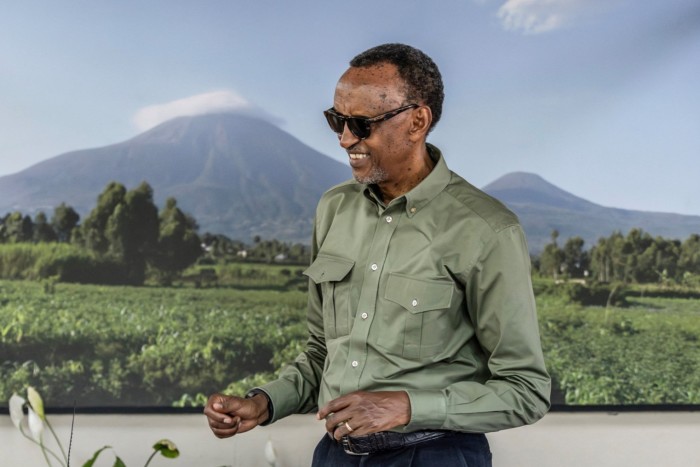Unlock the Editor’s Digest for free
Roula Khalaf, Editor of the FT, selects her favourite stories in this weekly newsletter.
As the prospect of peace in Gaza and even in Ukraine rises, however slightly, war has erupted in another part of the world. This week, Rwanda-backed M23 rebels occupied Goma, a city in the east of the Democratic Republic of Congo, on the border with its tiny but militarily powerful neighbour. The DRC has called it a “declaration of war” by Paul Kagame’s Rwanda. The prospect of full-blown conflict between the two countries is rising. That could even suck in other states. The last time something similar happened in the late-1990s, in what became known as “Africa’s world war”, many millions died as a direct and indirect consequence.
What has been a slow-burn crisis in eastern DRC has again exploded into the open. Kagame appears to have calculated that a change of US administration is a good time to strike. A peace process mediated by Angola and sponsored by the US collapsed in the dying days of Joe Biden’s administration.
M23 rebels control increasingly large areas of eastern Congo, with its reserves of minerals needed by the world’s electronics giants. It has been an open secret for years that gold and metals such as coltan, used in smartphones and other devices, come from militia-controlled mines in eastern Congo but are retagged as Rwandan exports. Kinshasa says it is losing $1bn a year in smuggled minerals, claims that have been at least partly substantiated by UN expert reports.
Kagame has also been emboldened by the silence of the west, which despite occasional protests has turned a blind eye to Rwanda’s stealth occupation of eastern Congo — as well as to his repressive rule at home. Europe in particular has stepped up its aid to Rwanda. It has also helped pay for Rwanda’s military, which has protected European interests, including French gas reserves in northern Mozambique where Rwandan troops have been deployed to help put down an insurgency.
Felix Tshisekedi, DRC’s president, who has vowed to retake Goma, has contrasted the west’s indulgence of Rwanda with its condemnation of Russia. It is true the west has gone easy on Kagame, Rwanda’s gifted, ruthless and autocratic president. Guilt over inaction during the 1994 genocide — in which up to 1mn Tutsis and moderates from the majority Hutu ethnic group were slaughtered by Hutu extremists — has made western governments reluctant to criticise Kagame, whose arrival ended the slaughter. They have sympathised with his view that eastern Congo is lawless and overrun with militias, some of which threaten Rwanda’s security.
Western governments have also been impressed by Rwanda’s successes in development and poverty alleviation. These may not be as triumphant as Kigali and aid agencies like to pretend. But Rwanda has been more efficient than many other countries at transforming aid dollars into real advances in health, education, infrastructure and ultimately people’s living standards.
None of this is any excuse to give Rwanda a free pass. In recent days, the US, France, the EU and even the UK — one of Kagame’s most permissive backers — have stepped up their rhetoric, demanding Kagame back off. David Lammy, the UK’s foreign secretary, has rightly gone further than his predecessors in threatening to cut off western aid.
Words, though, need to be followed by actions. Rwanda is still heavily dependent on western backing. The last time M23 occupied Goma, assistance was suspended and Barack Obama, then US president, persuaded Kagame to cool tensions. Within weeks, M23 withdrew and faded as a force. Pressure worked then and it can work again. This is a war that can be ended quickly. The time for indulging Kagame is over.

